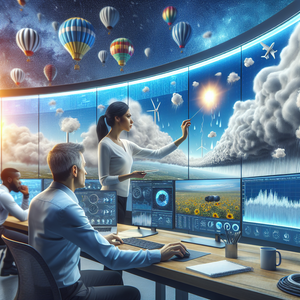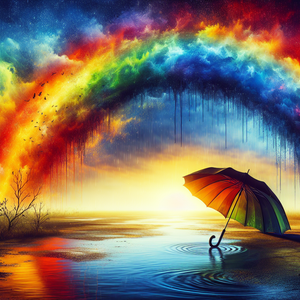
Navigating the Skies: 20 Exciting Careers in Meteorology and Weather Forecasting
In an era where climate change and unpredictable weather patterns dominate headlines, the field of meteorology has become increasingly vital. As public demand for accurate weather forecasting grows, so does the array of career opportunities available in this dynamic field. This article explores 20 diverse roles within meteorology, emphasizing their significance in providing reliable forecasts, advancing climate research, and ensuring public safety. With job prospects expanding, aspiring meteorologists can find positions that align with their educational background, technical skills, and communication prowess. From scientists who delve into atmospheric mysteries to communicators who bring forecasts to life, each role plays a crucial part in equipping society to navigate weather-related challenges. We’ll also touch on key trends, average salaries, and the essential skills that are shaping the future of meteorology, providing valuable insights for those eager to embark on a career in this essential sector.
Job Summaries:
Meteorologist:
- Meteorologists are at the forefront of weather prediction.
- They use data from satellites, radar, and sophisticated models to assess atmospheric conditions.
- A bachelor’s degree in meteorology or atmospheric science is typically required.
- These professionals play a crucial role in safeguarding public safety by delivering timely forecasts.
- Timely forecasts allow communities to prepare for severe weather.
Weather Analyst:
- Weather analysts are essential in interpreting meteorological data.
- They utilize advanced computer models and statistical tools to identify weather patterns.
- A background in meteorology or a related field is essential.
- Experience in data analysis is important.
- Their insights aid industries like agriculture and aviation.
- They drive informed decision-making.
Climatologist:
- Focusing on long-term weather trends, climatologists study climate change and its implications.
- A master’s or Ph.D. in climatology or environmental science is typically required.
- Their research is pivotal in shaping environmental policies and promoting sustainability.
Broadcast Meteorologist:
- Broadcast meteorologists serve as the link between complex weather data and the public.
- They deliver forecasts via television, radio, or online platforms.
- Strong communication skills are crucial for this role.
- A degree in meteorology is important for this role.
- This role is especially critical during severe weather events.
Atmospheric Scientist:
- Atmospheric scientists examine the physical and chemical properties of the atmosphere.
- They often require a master’s or Ph.D. in atmospheric science.
- Their research influences public policy and climate adaptation strategies.
- Their work is vital to addressing climate challenges.
Environmental Meteorologist:
- Environmental meteorologists investigate how weather affects environmental factors, such as air quality and pollution levels.
- A degree in meteorology or environmental science is necessary, alongside analytical skills.
- Their work is crucial for developing strategies that protect public health and natural resources.
Weather Technician:
- Weather technicians support meteorologists by collecting and analyzing real-time data from the field.
- Typically requiring a degree in meteorology or a related technical field.
- Their accuracy is essential for effective weather forecasting.
Climate Scientist:
- Climate scientists research the Earth's climate system
- Often needing a Ph.D. to develop predictive models for future climate scenarios
- Their findings inform climate policy and community adaptation strategies.
Hydrometeorologist:
- Hydrometeorologists study the relationship between the atmosphere and water resources.
- They focus on precipitation and water quality.
- A degree in meteorology, hydrology, or environmental science is required for this role.
- This role is critical for effective water management.
Weather Forecaster:
- Weather forecasters analyze data to create and communicate forecasts to the public.
- A bachelor’s degree in meteorology is typically required, alongside strong communication abilities.
- Their work is vital for public safety and preparedness during extreme weather events.
Air Quality Meteorologist:
- Air quality meteorologists investigate how weather conditions impact air pollution.
- With a degree in meteorology or environmental science, they provide insights that guide public health initiatives.
Marine Meteorologist:
- Specializing in oceanic weather conditions
- Marine meteorologists provide forecasts crucial for maritime operations
- A degree in meteorology or oceanography is required
- Analytical skills are necessary
Severe Weather Specialist:
- Severe weather specialists analyze extreme weather phenomena, such as hurricanes and tornadoes.
- A bachelor’s degree in meteorology is typically required, along with specialized training.
Remote Sensing Scientist:
- Utilizing satellite data, remote sensing scientists monitor atmospheric conditions and contribute to climate monitoring efforts.
- A degree in meteorology or geography is usually required, along with strong computational skills.
Weather Consultant:
- Weather consultants offer customized forecasts for various industries.
- They help clients in agriculture, energy, and transportation make informed decisions.
- A degree in meteorology is often necessary.
- Industry-specific knowledge is also important.
Weather Researcher:
- Weather researchers explore atmospheric processes to enhance forecasting methodologies.
- Typically requiring a Ph.D., they publish their findings and collaborate with organizations to drive technological advancements.
Public Safety Meteorologist:
- These meteorologists focus on how weather impacts community safety.
- Often collaborating with government agencies to provide forecasts and disaster response guidance.
- A degree in meteorology or emergency management is usually required.
Agricultural Meteorologist:
- Agricultural meteorologists examine the influence of weather on farming.
- They offer forecasts to optimize agricultural practices.
- A degree in meteorology or agricultural science is typically necessary for this role.
Weather Data Scientist:
- Weather data scientists analyze extensive datasets to improve forecasting accuracy.
- Typically requiring a degree in meteorology or data science, along with programming skills.
- Their work is critical for innovative advancements in weather technology.
Weather Photographer/Visual Storyteller:
- Weather photographers capture stunning images of weather phenomena.
- Using visual storytelling to raise public awareness about environmental issues.
- A background in photography or communications enhances this role.
- This role requires strong creative skills.
These career paths illustrate the vast opportunities within the field of meteorology, catering to a wide range of interests and skill sets. As the landscape of this profession continues to evolve, there are countless opportunities for those ready to pursue a meaningful career in meteorology. Explore the provided links for current job openings and take the first step toward an exciting future in weather science.
Explore More Jobs

